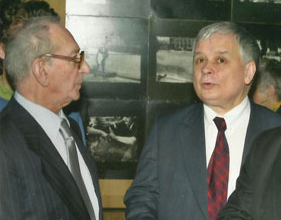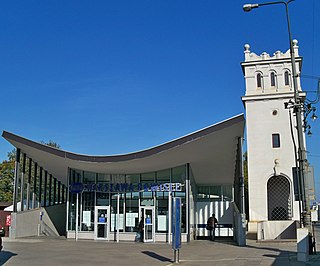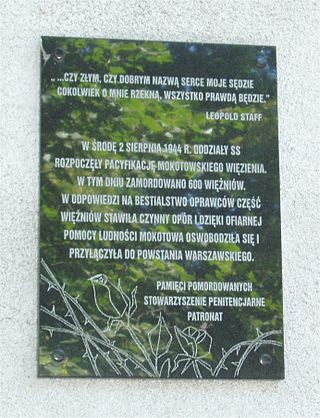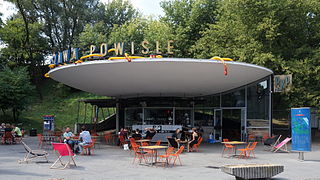
Gazeta Wyborcza is a Polish nationwide daily newspaper based in Warsaw, Poland. It was launched on 8 May 1989 on the basis of the Polish Round Table Agreement and as a press organ of the trade union "Solidarity" in the election campaign before the Contract Sejm. Initially created to cover Poland's first partially free parliamentary elections, it rapidly grew into a major publication, reaching a circulation of over 500,000 copies at its peak in the 1990s.

Krzysztof Kamil Baczyński, was a Polish poet and Home Army soldier, one of the most well known of the Generation of Columbuses, the young generation of Polish poets, of whom several perished in the Warsaw Uprising and during the German occupation of Poland.

Lao Che is a Polish rock band formed in 1999 in Płock by former members of the band Koli. Lao Che's musical genre is a crossover of various styles such as ska, ambient, and folk. The band's popularity grew quickly after their Powstanie Warszawskie concept album, which received many prestigious nominations and awards.

Jerzy Maria Kirchmayer (1895–1959) was a Polish historian and military commander, a brigadier general of the Polish Army and one of the first historians of the Warsaw Uprising of 1944.

Henryk Batuta was a hoax article on the Polish Wikipedia from November 2004 to February 2006, the main element of which was a biographical article about a nonexistent socialist revolutionary, Henryk Batuta.

The Łódź insurrection, also known as the June Days, was an uprising by Polish workers in Łódź against the Russian Empire between 21 and 25 June 1905. This event was one of the largest disturbances in the Russian-controlled Congress Poland during the Russian Revolution of 1905. Poland was a major center of revolutionary fighting in the Russian Empire in 1905–1907, and the Łódź insurrection was a key incident in those events.

Stanisław Jankowski was an SOE agent and Polish resistance fighter during World War II, and an architect thereafter, who played a prominent role in the post-war reconstruction of Warsaw.

Jerzy Tomaszewski, nom de guerreJur, was a Polish World War II photographer, artist, and reporter, awarded the Order of Polonia Restituta by President Lech Kaczyński.

Warszawa Powiśle, in English Warsaw Powiśle, is an urban railway station in Warsaw, Poland. Located in the neighborhood of Powiśle in borough of Śródmieście (Downtown), stretching between Aleje Jerozolimskie near Rondo Charles'a de Gaulle'a, and the intersection of Aleja 3 Maja and ul. Kruczkowskiego.

Aga Zaryan is a Polish jazz vocalist and the first Polish musician to sign with Blue Note Records.

The mass murder on Dzika street was a war crime committed by German troops against Polish civilians during World War II, amidst the Warsaw Uprising on August 21, 1944. The execution took place in the yard of a housing block on Dzika 17 street. Around 200 civilians were killed. While nowhere near as large as the wholesale massacre in Wola, it was one of the largest mass murder carried out by the Nazis during the battle of Warsaw Old Town.

Olga Lipińska is a Polish theatre director, screenwriter, and TV comedy producer, best known for her TV cabaret called the Kabaret Olgi Lipińskiej.

"W" Hour, also spelled as W-Hour(Polish: Godzina „W”'), was the codename for the date and time that began Operation Tempest in German-occupied Warsaw, and hence the Warsaw Uprising. The exact time was 5:00 PM on 1 August 1944.

The execution at Powązkowska Street - a mass murder of 22 Warsaw residents of Powązki by the Germans on 1 August 1944. This execution, which claimed the lives of men living in a house at 41 Powązkowska Street, was one of the first German crimes committed during the suppression of the Warsaw Uprising.

The Suppression of Mokotów was a wave of mass murders, looting, arson and rapes that swept through the Warsaw district of Mokotów during the Warsaw Uprising in 1944. Crimes against prisoners of war and civilians of the district were committed by the Germans until the capitulation of Mokotów on September 27, 1944, although they intensified in the first days of the uprising.

The Massacre in the Mokotów prison was a mass murder of residents of the Mokotów Prison in Warsaw by the Germans on the second day of the Warsaw Uprising. On August 2, 1944, soldiers of the Waffen-SS - SS-Pz. Gren. Ausb.-und Ers. Btl. 3 shot about 600 Poles on the premises of the prison at 37 Rakowiecka Street. It was one of the biggest crimes committed by the Germans in Mokotów during the suppression of the Warsaw Uprising. During the massacre, some prisoners actively resisted the Nazis, which allowed several hundred people to escape to the area controlled by the insurgents.

Grupa Warszawa is a Polish entertainment company based in Warsaw, Poland, founded in 2008 by the entrepreneur and film producer Norbert Redkie. The company manages clubs, restaurants, and music venues in its namesake Warsaw, including a café-bar Warszawa Powiśle, restaurant Syreni Śpiew Koneser, as well as a feature-film production house Mental Disorder 4.

Norbert Bogdan Redkie is a Polish entrepreneur, restaurateur, lecturer, and film producer. He is a co-founder of a restaurant company Grupa Warszawa, which runs local clubs, bars, and restaurants in Warsaw, and produces feature films in a production studio Mental Disorder 4.

Róża Maria Goździewska was a Polish nurse, known as the youngest nurse of the 1944 Warsaw Uprising when she was a child.

The Suppression of Wawrzyszew was an pacification operation during the Second World War, enacted by German forces on the population of the village of Wawrzyszew. It took place on 3 August 1944, during the Warsaw Uprising, and as part of it, 30 inhabitants of the village were killed, the buildings set on fire, and remaining population displaced.




















